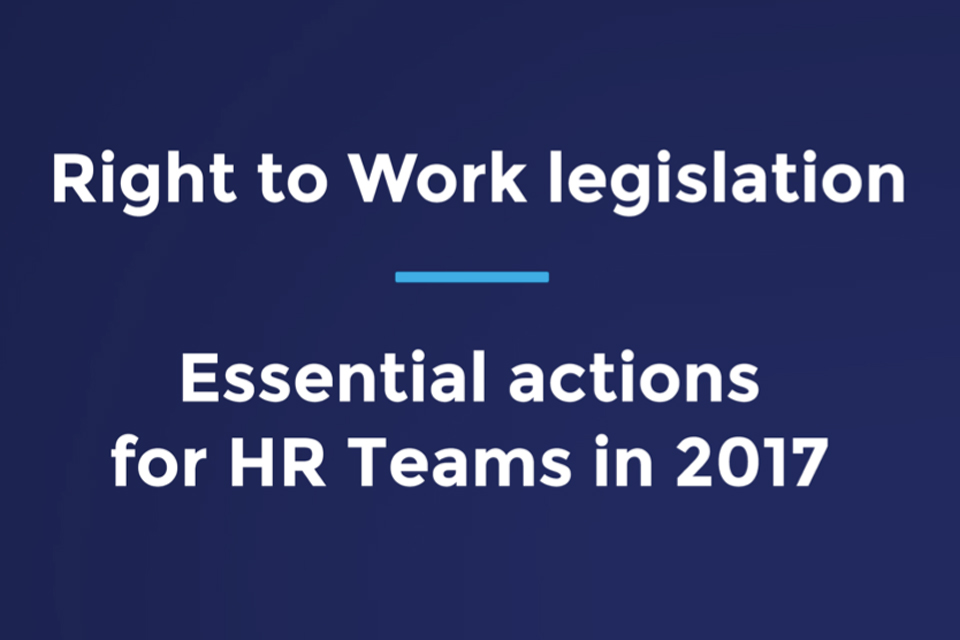By Mark Andrews, MD at Rightcheck.io
As an employer, you have a duty to prevent illegal working. You may discharge this duty and obtain a statutory excuse (a defence) against liability by conducting compliant Right to Work checks.
With severe financial penalties, prosecution and reputational damage arising from non-compliance all organisations are urged to be aware of recent changes to employment legislation concerning these checks.
To establish the statutory excuse, the Right to Work check must be done before the person starts employment. An excuse is not established if the check is done on the employee’s first day or any time thereafter.
Whilst not mandatory, it is advisory that Right to Work checks should be done for all potential employees undergoing a recruitment and selection process and not just the individual(s) to which job offers are ultimately issued.
This approach (i) avoids costly discovery at the latter stages of a recruitment process of an applicant with no right to work and (ii) further underpins an equal opportunities recruitment policy.
Key changes to Right to Work legislation were introduced in 2014 and 2016. Organisations must also now prepare for the implications of GDPR (effective May 2018) – concerning their approach to collection and processing of personal data when on-boarding new recruits.
TO READ MORE PLEASE CLICK HERE.
In 2014 new statutory codes of practice on preventing illegal working and on avoiding unlawful discrimination while preventing illegal working came into effect. Coincident, there were several revisions to the method and process for conducting a satisfactory Right to Work check. These revisions included:
- Acceptable documents were changed, with documents not acceptable to provide a statutory excuse identified
- Expired documents that were acceptable and exceptions were explained • How evidence of the check undertaken must be recorded was defined
- How copies of ID documentation must be attested and dated was defined
The Immigration Act 2016 introduced further measures:
- A new offence of working in the UK illegally
- Criminal offence of knowingly hiring an illegal worker extended to where an employer employs someone whom they have reasonable cause to believe is an illegal worker
- Powers for Immigration Officers to close an organisation for up to 48 hours, or place under special compliance measures, where the organisation is suspected of non-compliance
- A new Director of Labour Market Enforcement supported by an intelligence hub to share data across government departments and agencies
There is also now clarity on who is at liberty to conduct the check, how long evidence must be retained and what to do in business takeover (TUPE) situations. As the Home Office guidance states:
The employer (not a third party) must undertake the check:
- As the employer, you are liable for the civil penalty even if the actual check is performed by a member of your staff. You are unable to establish a statutory excuse when the check is performed by a third party, such as an independent payroll company.
Evidence must be readily accessible and retained for 2 years after employee leaves:
- You must keep a record of every document you have checked. This can be a hardcopy or a scanned and unalterable copy, such as a jpeg or pdf document. You should keep the copies securely for the duration of the person’s employment and for a further two years after they stop working for you.
- You should also be able to produce these document copies quickly in the event that you are requested to show them to demonstrate that you have performed a Right to Work check and retain a statutory excuse. By doing this, we will be able to check whether you have complied with the law if we find that someone is, or has been working for you illegally.
Employers should repeat Right to Work checks in TUPE situations:
- Transfer of undertakings Transfer of Undertakings (Protection of Employment) (TUPE) regulations provide that right to work checks carried out by the transferor (the seller) are deemed to have been carried out by the transferee (the buyer). As such, the buyer will obtain the benefit of any statutory excuse acquired by the seller.
- However, if the seller did not conduct the checks correctly, the buyer would be liable for a penalty if an employee is later found to be working illegally. Also, a check by the buyer would be necessary to determine when any follow-up check should be carried out. For these reasons, employers who acquire staff through TUPE regulations should undertake a right to work check on all new TUPE members of staff.
Should you have any concerns about your current processes or procedures regarding Right to Work checks then Rightcheck can help.
We have developed an online-tool to get a quick appraisal of your current process and a guidance paper on ‘essential actions’ to ensure compliance with legislation:
Please access the online check by clicking here
Please access the guidance paper by clicking here
With Rightcheck there is no more worry, paper processing or challenge to conducting compliant Right to Work checks across your organisation.
Please contact us for an on-line demo, or to organise a trial. To find out more please visit www.rightcheck.io.






